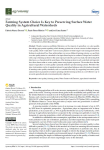Derossi F.N., Ribeiro P.F., Santos J.L. (2024). Farming system choice is key to preserving surface water quality in agricultural watersheds. Agronomy, 01/01/2024, vol. 14, n. 1, p. 214.
https://doi.org/10.3390/agronomy14010214
https://doi.org/10.3390/agronomy14010214
| Titre : | Farming system choice is key to preserving surface water quality in agricultural watersheds (2024) |
| Auteurs : | F.N. Derossi ; P.F. Ribeiro ; J.L. Santos |
| Type de document : | Article |
| Dans : | Agronomy (vol. 14, n. 1, January 2024) |
| Article en page(s) : | p. 214 |
| Langues : | Anglais |
| Langues du résumé : | Anglais |
| Catégories : |
Catégories principales 06 - AGRICULTURE. FORÊTS. PÊCHES ; 6.4 - Production Agricole. Système de ProductionThésaurus IAMM SYSTEME DE PRODUCTION ; SYSTEME AGRAIRE ; QUALITE DE L'EAU ; IMPACT SUR L'ENVIRONNEMENT ; PORTUGAL |
| Résumé : | Despite numerous published literature on the impacts of agriculture on water quality, knowledge gaps persist regarding which farming systems are of most concern for their impact on water quality, which would allow water resource planners to better target water management efforts. Seeking to understand how these relationships vary across different farming systems, we used data on water quality status in watersheds of an agricultural region in southern Portugal and overlaid it with a map of farming systems for the same region provided by a previous study. By intersecting both data layers, we characterized the areal shares of the farming systems in each watershed and inspected how these shares relate to water quality status using logistic regression. The results show that the impact of agriculture on water quality is primarily related to specific farming systems. We believe this type of information can be of significant interest to agricultural planners and policymakers interested in meeting water quality standards, and we conclude this study by suggesting innovative policy options based on payments to farmers operating selected farming systems as a cost-effective way to reconcile agricultural and environmental policy objectives. |
| Cote : | En ligne |
| URL / DOI : | https://doi.org/10.3390/agronomy14010214 |







